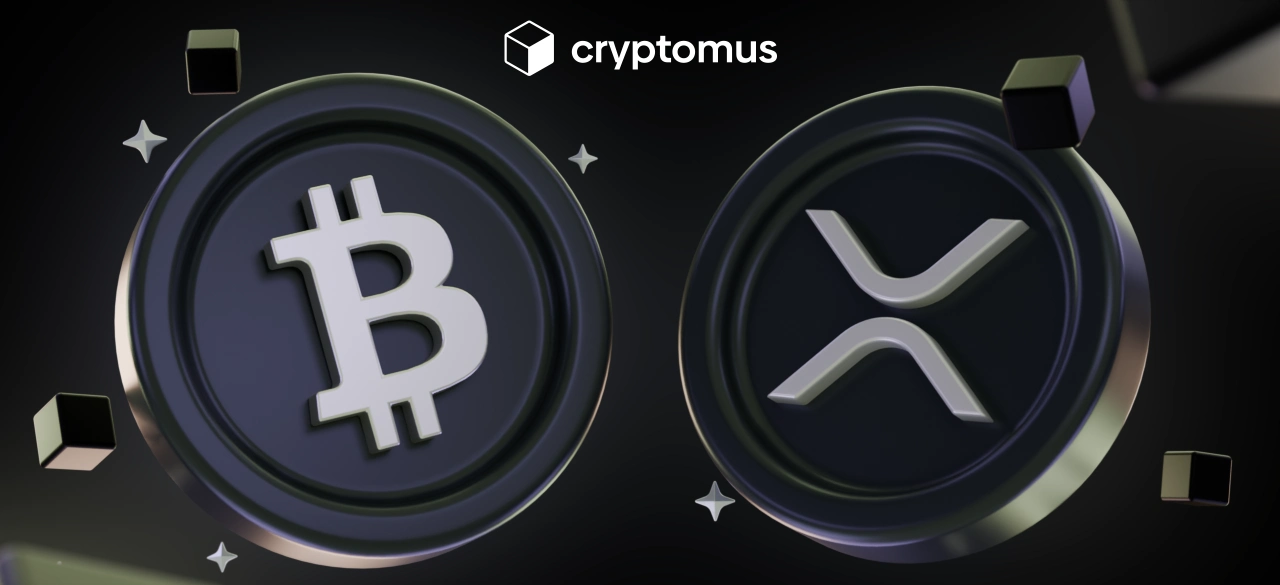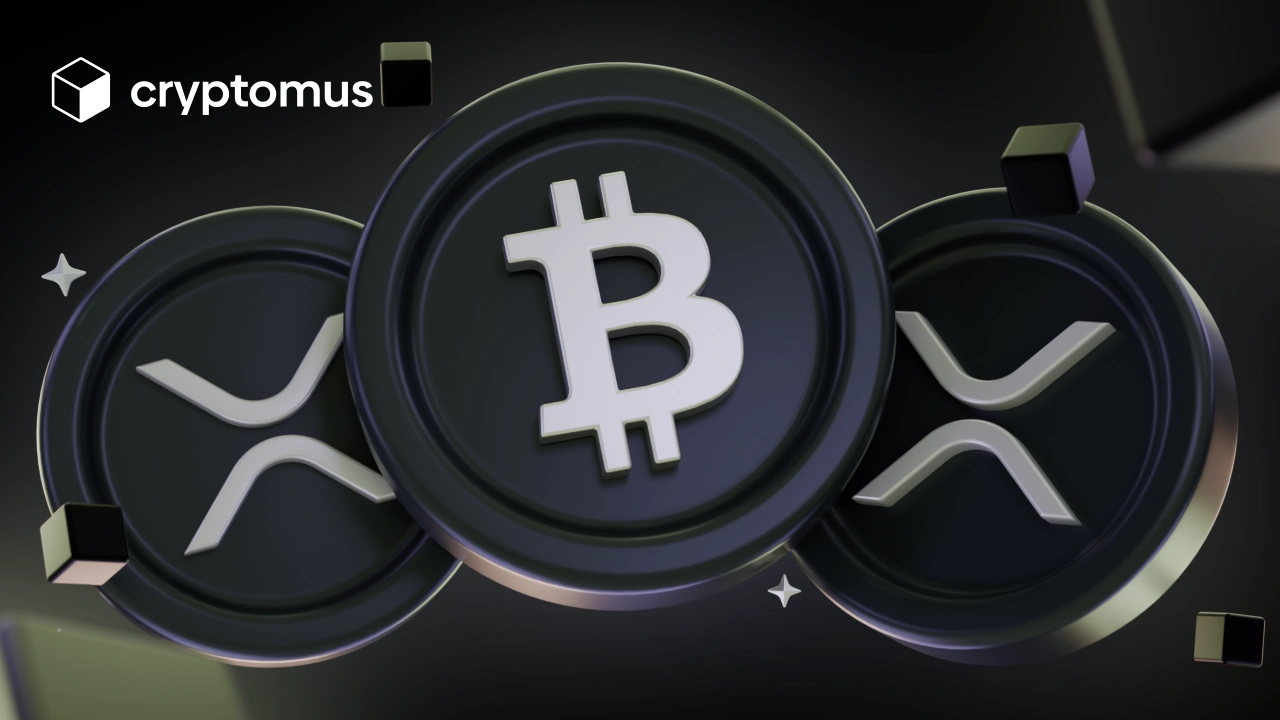
Bitcoin Vs. Ripple: A Complete Comparison
Table of Contents
Bitcoin and Ripple hold significant roles in the crypto industry but have distinct functions. However, what sets them apart?
This guide will give you a thorough comparison of BTC and XRP. We will analyze the main differences, study practical applications, and help decide between these two cryptos.
What Is Bitcoin (BTC)?
Bitcoin is the very first and most well-known cryptocurrency. Essentially, it's what ignited the crypto boom.
It was launched in 2009 as a decentralized payment option. It operates on a blockchain and allows users to transact without involving banks. Bitcoin's total supply is capped at 21 million coins, creating an inherent scarcity. Combined with growing demand, it has led to substantial price increases.
What Is Ripple (XRP)?
Ripple was introduced in 2012, aiming to make international money transfers quick and inexpensive.
XRP, Ripple's native cryptocurrency, facilitates rapid and cheap cross-border transactions. By offering a smooth and efficient fund transfer system, it seeks to modernize the global banking infrastructure.
Bitcoin Vs. Ripple: Key Differences
XRP and Bitcoin differ in transaction speed, fees, total supply, consensus mechanism, and purpose. Let's unpack these differences:
Consensus Mechanism
Bitcoin uses a power-consuming Proof-of-Work mechanism where miners compete to validate transactions. Ripple offers a greener alternative by utilizing a trusted network of validators, defined by UNLs (Unique Node Lists). Each node on the Ripple network has its own UNL, ensuring a decentralized decision-making process. And unlike Bitcoin's competitive model, Ripple's consensus mechanism is achieved through agreement among these trusted validators, resulting in a more energy-efficient and potentially faster transaction validation process.
Transaction Speed
Ripple transactions are way faster than Bitcoin's, taking seconds instead of an hour-long timeframe. Bitcoin's transaction speeds have been criticized, hindering its use for everyday transfers. Ripple's rapid processing speed has attracted users who need fast money transfers.
Fees
Sending Bitcoin can come with a variable cost. Transaction fees depend on how busy the network is and the amount you're sending. On average, BTC fees range from $1 to $10. But during times of high demand, they can drastically increase, sometimes reaching over $20 per transaction and making small transactions impractical.
Ripple’s fees are significantly lower, with the average fee being only 0.00001 XRP. Given the current price of XRP, this fee is a fraction of a cent, making Ripple one of the most cost-effective options for transferring money.
Scalability
The fixed block size and increasing user base have continuously posed challenges for Bitcoin's scalability. This mix frequently leads to network overcrowding and higher transaction costs. Ripple is built for efficiency, handling massive transaction volumes rapidly and cost-effectively.
Use Case Focus
Bitcoin aspires to serve as a form of value storage that could potentially replace conventional currencies. It has made BTC popular among those looking to preserve their funds outside traditional financial systems.
Ripple aims to improve the traditional banking system instead of replacing it. Its goal is to decrease both transaction durations and expenses by simplifying global money transfers. XRP can easily integrate with current financial systems, offering banks and payment providers a more effective solution for global transactions.

Supply and Distribution
Bitcoin's limited supply of 21 million coins creates scarcity, potentially driving up prices. And Ripple's total supply stands at a significantly larger 100 billion XRP tokens. A portion of these XRP tokens is held in escrow by Ripple Labs. This centralized distribution has raised concerns about decentralization and control.
Is XRP The Next Bitcoin?
The choice between Bitcoin and Ripple hinges on your situation and financial objectives. Bitcoin is better for those seeking a long-term store of value with price increment potential. Ripple works best for rapid, low-cost transactions, especially for international ones.
XRP has growth potential, but it's doubtful it will replace Bitcoin. The thing is, it occupies a distinct niche from BTC. While Bitcoin centers around being a digital store of value, XRP prioritizes swift, low-cost global payments.
Bitcoin Vs. Ripple: Use Cases Of Both Coins
As we’ve mentioned earlier, BTC and XRP have distinct use cases, and it's important to examine them closely. Bitcoin use cases include:
- Digital Currency: BTC facilitates transactions without intermediaries, enabling users to make payments directly to each other.
- Store of Value: Bitcoin is often used as a long-term investment and protection against inflation. There’s also a potential for price increments that attract even more investors.
- DeFi: It can be used for lending, borrowing, and earning interest on DeFi platforms, expanding its financial uses.
The use cases of Ripple are:
- Cross-Border Payments: XRP speeds up international payments for banks and financial institutions at a reduced price.
- Banking: Ripple partners with financial institutions to expedite and simplify cross-border payments. It allows banks to reduce the time and cost of international money transfers.
- Everyday Transactions: For the average user, Ripple provides a convenient and cost-effective method for sending and receiving money swiftly. This can be especially beneficial for individuals who transfer money to relatives in different countries.
Bitcoin Vs. Ripple: Head-To-Head Comparison
With the primary characteristics of Bitcoin and Ripple established, we can proceed to a direct comparison. The following table lets you compare XRP and BTC head-to-head:
| Feature | Bitcoin (BTC) | Ripple (XRP) | |
|---|---|---|---|
| Launch Year | Bitcoin (BTC)2009 | Ripple (XRP)2012 | |
| Creator | Bitcoin (BTC)Satoshi Nakamoto | Ripple (XRP)Ripple Labs | |
| Supply | Bitcoin (BTC)21 Million | Ripple (XRP)100 Bllion | |
| Consensus Mechanism | Bitcoin (BTC)Proof of Work (PoW) | Ripple (XRP)Consensus Algorithm | |
| Transaction Speed | Bitcoin (BTC)10 Minutes to 1 Hour | Ripple (XRP)3-5 Seconds | |
| Transaction Fees | Bitcoin (BTC)From $1 to over $20 | Ripple (XRP)0.00001 XRP | |
| Scalability | Bitcoin (BTC)7 Transactions Per Second | Ripple (XRP)1,500 Transactions Per Second | |
| Primary Use Case | Bitcoin (BTC)Store of Value, Digital Currency | Ripple (XRP)Cross-Border Payments, Banking Solutions | |
| Decentralization | Bitcoin (BTC)Highly Decentralized | Ripple (XRP)Less Decentralized | |
| Goal | Bitcoin (BTC)Decentralized Currency | Ripple (XRP)Efficient Payments | |
| Price | Bitcoin (BTC)High Price | Ripple (XRP)Lower Price |
Bitcoin Vs. Ripple: Which Is The Better Investment?
The decision to invest in Bitcoin or Ripple eventually comes down to your risk tolerance, financial situation, and trading style. Both cryptocurrencies offer unique opportunities, but their differences can greatly impact profitability and investment strategy.
Bitcoin has established itself as a market leader with the highest market cap, and it’s a popular choice for long-term investors. Its widespread adoption and recognition also contribute to a more stable investment environment. Over the years, it has proven to be a volatile, but potentially lucrative asset. Generally, it’s a high-risk, high-reward kind of token, but it can be hard to track its price movements.
As for Ripple, it shows a different pattern. Of course, it’s also volatile, but its price swings are usually correlated with market trends and Ripple-specific news. Thus, it’s easier to predict when its price is about to change and make investment decisions according to it. Plus, its lower price per coin and adoption by the banking sector means it has a potential for high returns. It also has low fees, so it will work great for those who plan to make frequent transactions.
Now you understand that Bitcoin and Ripple each have unique roles in the crypto landscape. Bitcoin has established itself as a decentralized store of value, while Ripple prioritizes quickness and effectiveness. The decision of which is superior largely depends on the intended purpose, as they serve varying needs.
Hopefully, this guide was helpful. Send in your thoughts and experiences below!
Simplify Your Crypto Journey
Want to store, send, accept, stake, or trade cryptocurrencies? With Cryptomus it's all possible — sign up and manage your cryptocurrency funds with our handy tools.
Get Started









